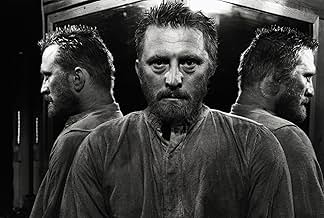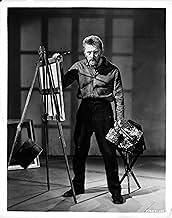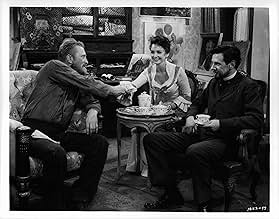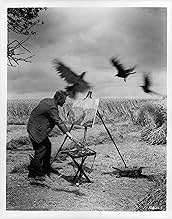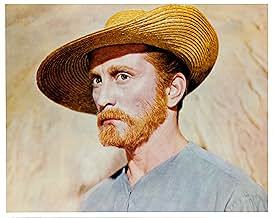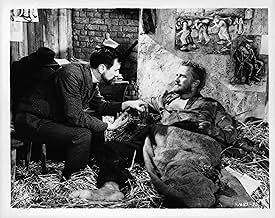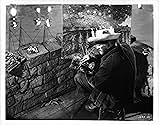- Won 1 Oscar
- 4 wins & 6 nominations total
- Directors
- Writers
- All cast & crew
- Production, box office & more at IMDbPro
Featured reviews
This film is a rarity, a biopic which is more accurate than the book it's based on. Irving Stone's book was a major best-seller which did much to make Vincent Van Gogh one of the ten most famous artists in history but it did have its inaccuracies, particularly when it depicted its protagonist in Paris with other great painters of the time. In the book, Gauguin, Lautrec, Cezanne and Rousseau come off as typical bohemians while Vincent was made much more of a leader than he was. Minelli doesn't give us a detailed look at any of the artists except Gauguin but he is more accurate about who influenced Van Gogh and he does include his best friend, the now-forgotten Emile Bernard, if only as an extra in Tanguy's shop.
When Lust for Life came out, several critics dismissed it as too lurid and melodramatic, but those adjectives are accurate in describing Van Gogh's life. Note that Kirk Douglas does not play his usual cool, fun-loving tough guy and actually uses his whole body in his acting. For once Hollywood outdid itself.
When Lust for Life came out, several critics dismissed it as too lurid and melodramatic, but those adjectives are accurate in describing Van Gogh's life. Note that Kirk Douglas does not play his usual cool, fun-loving tough guy and actually uses his whole body in his acting. For once Hollywood outdid itself.
Not only does KIRK DOUGLAS bear a remarkable resemblance to the real Vincent Van Gogh, but he gives a deeply felt, bigger than life performance in the role of a lifetime, fully deserving his Academy Award nomination.
The letterbox version on TCM doesn't do justice to the film's brilliant color photography, deliberately muted for the early coal mining scenes but crisp and clear when it comes to Van Gogh's now famous paintings. I haven't seen the DVD version, but I hope it's considerably better than the print showing on cable.
At any rate, it's tremendously well done--the entire look of the production creating the sense of time and authentic atmosphere and actually filmed on the actual location sites with an impressive cast of villagers and supporting actors. PAMELA BROWN, NIALL MacGINNIS (as The Postman), and most of all, JAMES DONALD as brother Theo, who nurtures his brother and supports him financially but is unable to sell any of his paintings--except one.
It's a fine recreation of the Irving Stone novel and Douglas immerses himself in the character of Van Gogh, much the way ANTHONY QUINN does as Gauguin. Quinn's stormy, tempestuous relationship with Douglas provides some electric moments of conflict.
The score by Miklos Rozsa accents the drama at every turn, slashing at the drama the way Van Gogh slashed at his canvas with thick brush strokes. It's starkly dramatic without ever being overbearing.
Vincent Minnelli's direction is above reproach. A finer tribute to the tormented artist could not be imagined with so many of his canvases shown on screen in impressive close-ups.
The letterbox version on TCM doesn't do justice to the film's brilliant color photography, deliberately muted for the early coal mining scenes but crisp and clear when it comes to Van Gogh's now famous paintings. I haven't seen the DVD version, but I hope it's considerably better than the print showing on cable.
At any rate, it's tremendously well done--the entire look of the production creating the sense of time and authentic atmosphere and actually filmed on the actual location sites with an impressive cast of villagers and supporting actors. PAMELA BROWN, NIALL MacGINNIS (as The Postman), and most of all, JAMES DONALD as brother Theo, who nurtures his brother and supports him financially but is unable to sell any of his paintings--except one.
It's a fine recreation of the Irving Stone novel and Douglas immerses himself in the character of Van Gogh, much the way ANTHONY QUINN does as Gauguin. Quinn's stormy, tempestuous relationship with Douglas provides some electric moments of conflict.
The score by Miklos Rozsa accents the drama at every turn, slashing at the drama the way Van Gogh slashed at his canvas with thick brush strokes. It's starkly dramatic without ever being overbearing.
Vincent Minnelli's direction is above reproach. A finer tribute to the tormented artist could not be imagined with so many of his canvases shown on screen in impressive close-ups.
I've seen this movie several times now, and every time with enjoyment and great appreciation.
The acting by Douglas and Quinn is truly first rate. It's a shame Douglas didn't get the best actor Oscar for which he was so deservedly nominated, but competition that year in that category was fierce. He truly makes you feel van Gogh's frightened agony, both at not being able to achieve what he wanted in his art and his fear of approaching insanity. (It ran in van Gogh's family; he knew what was coming.)
But I also enjoy the great efforts made to reproduce the scenes van Gogh painted, whether in Holland, Arles, or outside Paris. That couldn't have been easy, but if you know van Gogh's work, it really adds to the effect the movie makes.
There are times when the characters speak like an art history textbook - though those painters did love to discuss their theories on art, as you see in their letters.
Still, I consider this to be one fine movie. Whether it gives an accurate depiction of van Gogh or Gauguin is beside the point. It's based on a novel by Irving Stone, who didn't hesitate to change facts to make for a book that would sell; it's not a BBC documentary, and shouldn't be judged as such. It does a great job of showing us the torments of a great painter, and gives us some idea of what van Gogh was up to. That's more than enough for me.
The acting by Douglas and Quinn is truly first rate. It's a shame Douglas didn't get the best actor Oscar for which he was so deservedly nominated, but competition that year in that category was fierce. He truly makes you feel van Gogh's frightened agony, both at not being able to achieve what he wanted in his art and his fear of approaching insanity. (It ran in van Gogh's family; he knew what was coming.)
But I also enjoy the great efforts made to reproduce the scenes van Gogh painted, whether in Holland, Arles, or outside Paris. That couldn't have been easy, but if you know van Gogh's work, it really adds to the effect the movie makes.
There are times when the characters speak like an art history textbook - though those painters did love to discuss their theories on art, as you see in their letters.
Still, I consider this to be one fine movie. Whether it gives an accurate depiction of van Gogh or Gauguin is beside the point. It's based on a novel by Irving Stone, who didn't hesitate to change facts to make for a book that would sell; it's not a BBC documentary, and shouldn't be judged as such. It does a great job of showing us the torments of a great painter, and gives us some idea of what van Gogh was up to. That's more than enough for me.
Kirk Douglas is Vincent Van Gogh in "Lust for Life," directed by Vincent Minnelli and also starring Anthony Quinn as Gaugin (Oscar winner for his performance), and James Donal as Van Gogh's brother Theo.
This film is actually based on the Irving Stone novel and while it leaves out parts of Van Gogh's life, it does seem to hit the high points. A sensitive man with a spiritual sense of life, Van Gogh seeks from the beginning to express God in some way and to give something to the world. He is unsuccessful as a minister and eventually takes up painting, supported by his loving brother Theo. Basically he lives somewhere until whomever he's living with gets sick of him and throws him out. He is a terribly lonely man, but he has an intensity that is almost frightening to people. At one point, he takes up with a sometime prostitute with a baby - she eventually leaves. In actual fact, when Van Gogh met this woman, named Sien, she was pregnant with a second child, who grew up believing Van Gogh was his father. Sien some 20+ years later commits suicide.
Van Gogh establishes a friendship with Gaugin and has dreams of an artist colony, but his relationship with Gaugin, as with everyone but his brother, ends terribly when he stalks Gaugin with an open straight razor, later cutting off part of his own ear. It is evident from the film that whatever Van Gogh's mental problem was (and there are many theories, from bipolar, to epilepsy, to schizophrenia), it worsened as time went on, as did his physical condition. He would often buy paints rather than eat and would work ceaselessly.
Van Gogh only sold one painting in his lifetime - however, what the film does not show is that, had he chosen to live, he was on the brink of being recognized for his work. His paintings had started being exhibited and appreciated and began to sell shortly after his death. What also isn't in the film is that his brother died shortly after Van Gogh did. It was Theo's widow who carried on the work that would be involved with Van Gogh's vast collection.
The film reduced me to tears - indeed, the song that says "they should have told you, Vincent, the world was never meant for one as beautiful as you" was certainly true. The only person who ever "got" Vincent was his brother.
As for the performances, Kirk Douglas makes a brilliant Van Gogh. Michael Douglas once said his father isn't considered a great actor because the style back then in the types of roles he played has changed. It's true - seen today, Douglas' work seems too intense at times, too big, too over the top in these times of acting so naturally as to almost be boring. However, I believe that Van Gogh must have been like the Douglas characterization. He obviously drove people away in large masses, and Douglas captured that passion, drive, and overeagerness perfectly. As Theo, James Donal is perfect as the calm one in the family. Anthony Quinn has a short but memorable role as the flamboyant Gaugin. He's wonderful - arrogant, opinionated, temperamental, with a bad temper, and Quinn plays him as an artist without the soul of Van Gogh. But who, after all, had the soul of Van Gogh? Vincent Minnelli lovingly directed this film and it definitely has his wonderful attention to detail, flow, and artistic touch. And the paintings are breathtaking. A beautiful film that will stay with you for a long time, and you'll never see "Starry Night" in the same way again.
This film is actually based on the Irving Stone novel and while it leaves out parts of Van Gogh's life, it does seem to hit the high points. A sensitive man with a spiritual sense of life, Van Gogh seeks from the beginning to express God in some way and to give something to the world. He is unsuccessful as a minister and eventually takes up painting, supported by his loving brother Theo. Basically he lives somewhere until whomever he's living with gets sick of him and throws him out. He is a terribly lonely man, but he has an intensity that is almost frightening to people. At one point, he takes up with a sometime prostitute with a baby - she eventually leaves. In actual fact, when Van Gogh met this woman, named Sien, she was pregnant with a second child, who grew up believing Van Gogh was his father. Sien some 20+ years later commits suicide.
Van Gogh establishes a friendship with Gaugin and has dreams of an artist colony, but his relationship with Gaugin, as with everyone but his brother, ends terribly when he stalks Gaugin with an open straight razor, later cutting off part of his own ear. It is evident from the film that whatever Van Gogh's mental problem was (and there are many theories, from bipolar, to epilepsy, to schizophrenia), it worsened as time went on, as did his physical condition. He would often buy paints rather than eat and would work ceaselessly.
Van Gogh only sold one painting in his lifetime - however, what the film does not show is that, had he chosen to live, he was on the brink of being recognized for his work. His paintings had started being exhibited and appreciated and began to sell shortly after his death. What also isn't in the film is that his brother died shortly after Van Gogh did. It was Theo's widow who carried on the work that would be involved with Van Gogh's vast collection.
The film reduced me to tears - indeed, the song that says "they should have told you, Vincent, the world was never meant for one as beautiful as you" was certainly true. The only person who ever "got" Vincent was his brother.
As for the performances, Kirk Douglas makes a brilliant Van Gogh. Michael Douglas once said his father isn't considered a great actor because the style back then in the types of roles he played has changed. It's true - seen today, Douglas' work seems too intense at times, too big, too over the top in these times of acting so naturally as to almost be boring. However, I believe that Van Gogh must have been like the Douglas characterization. He obviously drove people away in large masses, and Douglas captured that passion, drive, and overeagerness perfectly. As Theo, James Donal is perfect as the calm one in the family. Anthony Quinn has a short but memorable role as the flamboyant Gaugin. He's wonderful - arrogant, opinionated, temperamental, with a bad temper, and Quinn plays him as an artist without the soul of Van Gogh. But who, after all, had the soul of Van Gogh? Vincent Minnelli lovingly directed this film and it definitely has his wonderful attention to detail, flow, and artistic touch. And the paintings are breathtaking. A beautiful film that will stay with you for a long time, and you'll never see "Starry Night" in the same way again.
Lust For Life may look, at first glance, to be a typical Hollywood biopic, which is usually not much more than a star vehicle about a famous, real-life but vacuously recreated character, denuded of any real personality. Minelli certainly makes his biopic of Vincent Van Gogh with his trademark lavishness. But, importantly, he does not glamorise his subject. Instead, he makes a visually rich but earthy film, which exalts Van Gogh's achievement and seeks to portray the realities of his creative life and the dark side of his personality.
Lust For Life focuses on the extremely troubled man Van Gogh was, at turns listless, priggish, childish, needy, manic and quick-tempered; but also sensitive, caring, thoughtful, romantic and altruistic. Kirk Douglas is superb as Van Gogh, holistically exhibiting his various and contradictory aspects: obsessive though circumspect artist, diffident but passionate friend, forlorn romantic and dangerous maniac. It is all the more of an accomplishment as he is such a muscular, good-looking leading actor (nor should Anthony Quinn's key supporting performance as Gauguin, a macho with hidden sensibilities, be neglected).
However, at the same time, what the film never forgets is Van Gogh's considerable achievement. Minelli's iridescence complements Van Gogh's colourful, vivacious visual style, and many of his paintings are shown throughout the film.
Critics have pointed to the over-use of melodrama in the film. Yet Lust For Life is rare in that the film is consummated by its melodrama, along with Miklós Rózsa's grand, sweeping music. In other words, its melodrama succeeds, making the viewer identify more with Douglas' Van Gogh, giving him a greater, but also justified, pathos and sense of tragedy.
Lust For Life is the best Hollywood Biopic
Lust For Life focuses on the extremely troubled man Van Gogh was, at turns listless, priggish, childish, needy, manic and quick-tempered; but also sensitive, caring, thoughtful, romantic and altruistic. Kirk Douglas is superb as Van Gogh, holistically exhibiting his various and contradictory aspects: obsessive though circumspect artist, diffident but passionate friend, forlorn romantic and dangerous maniac. It is all the more of an accomplishment as he is such a muscular, good-looking leading actor (nor should Anthony Quinn's key supporting performance as Gauguin, a macho with hidden sensibilities, be neglected).
However, at the same time, what the film never forgets is Van Gogh's considerable achievement. Minelli's iridescence complements Van Gogh's colourful, vivacious visual style, and many of his paintings are shown throughout the film.
Critics have pointed to the over-use of melodrama in the film. Yet Lust For Life is rare in that the film is consummated by its melodrama, along with Miklós Rózsa's grand, sweeping music. In other words, its melodrama succeeds, making the viewer identify more with Douglas' Van Gogh, giving him a greater, but also justified, pathos and sense of tragedy.
Lust For Life is the best Hollywood Biopic
Did you know
- TriviaMany of the locations used for filming were the actual locations Vincent van Gogh visited in his life.
- GoofsAt Arles, when Paul Gauguin is explaining his philosophy, Vincent mistakes him for Theo saying "but Theo, err Paul..." However, this is in the script. The whole point of the line is that Van Gogh views his conversation with Gauguin as nothing more than an extension of talks he's had with Theo since childhood.
- Quotes
Paul Gauguin: I'm talking about women, man. Women. I like 'em fat and vicious and not too smart. Nothing spiritual either. To have to say 'I love you' would break my teeth. I don't want to be loved.
Vincent Van Gogh: You really mean that, Paul.
- ConnectionsFeatured in Van Gogh: Darkness Into Light (1956)
- SoundtracksLa Marseillaise
(1792) (uncredited)
Written by Claude Joseph Rouget de Lisle
Played by a band in France, near the end
Details
Box office
- Budget
- $3,227,000 (estimated)
- Runtime
- 2h 2m(122 min)
- Aspect ratio
- 2.55 : 1
Contribute to this page
Suggest an edit or add missing content

![Watch Trailer [OV]](https://m.media-amazon.com/images/M/MV5BNjMwYjdhMDItMDA1NC00YjJlLWFhZjctYWY5YjBlNDdiODFiXkEyXkFqcGdeQXRyYW5zY29kZS13b3JrZmxvdw@@._V1_QL75_UX500_CR0)
